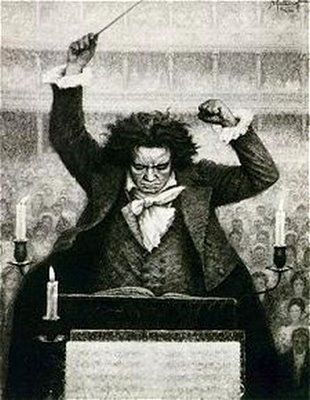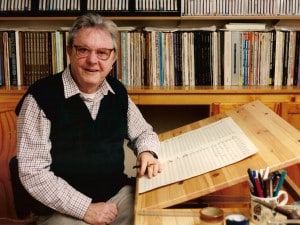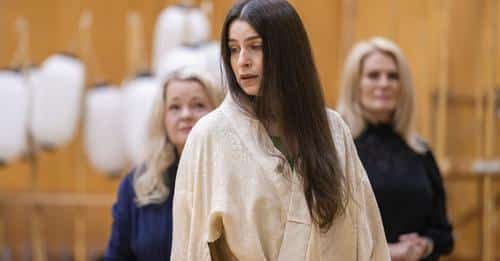Spoleto’s new boss: Let’s decolonise classical music
NewsMena Mark Harris, the new chief of SpoletoUSA, has some wonderfully fashionable guilt about how classical music treats the orient
He calls the lecture ‘A Horribly Discordant Noise: The Problem of Colonization in Classical Music’, which defines a problem of his own making. He goes on to pander to every curent wokeism. His guru is Edward Said and his thesis unoriginal.
Watch and wonder.






And Spoleto’s board took ten months to find him. One wonders what was going through their heads — until one reads the press release. Between its lines is the answer: money. Corporate; from foundations; governmental. Every penny with strings attached. Forget mission. That’s now so diffuse it’s meaningless; call it world art.
(yawn) Go Woke, Go Broke
God help us! If he cannot handle classical music for what it is and the grandness that comes with it, he should join a commune and bay at the moon for his contribution to the music world. Get over “everything is racist”. What a loser.
from the New York Times, July 13, 2021:
— Hanna has called classical music a “thoroughly colonized medium” … and he has criticized the persistence of orientalism in operas such as Aida.
— Hanna … said he would make it a priority to (a) use culture to confront the legacy of slavery in the U.S. and (b) build an inclusive environment.
— “Art has a … role to play … to bridge differences,” Hanna said in an interview. “More needs to be done [so] that we have diverse perspectives at every single point of the life-cycle of a work of art.”
— [Spoleto Festival has] an endowment of about $20 million and an annual budget of about $8 million, … staging some 77 opera, theater, dance and music performances over 17 days [yearly].
— Omar, an opera by Rhiannon Giddens … based on the autobiography of Omar Ibn Said, a Muslim man from West Africa who was enslaved and transported to Charleston in 1807, … will premiere at [Spoleto] next year.
NYTimes…..it’s not surprising somehow. A marxist-fascist newspaper without news and senseless. It is on it’s way to Hell!
Oh, joy.
If I was a talent agent, I would be searching for a transexual, biracial, non-white pygmy who has rave reviews from the one Classical critic remaining in the world, who is photogenic, conducts with a toothpick like VG, and is comfortable with conducting 10 weeks a year at each of his/her/they/them/theirs posts so that they can then guest conduct where needed.
Talented and qualified candidates (especially male) need not apply.
Great, Sir!! Great comment indeed!
In his obituary of Edward Said, the late Christopher Hitchens observed: “He was sometimes openly alarmed at the use made of his scholarship by younger academic poseurs who seemed to despise the classical canon of literature that he so much revered.” It would appear likely that he would feel the same way about his beloved music.
I wonder what he would make of this absurd tosh. Said’s influential work, Orientalism, raised some very valid points. Aida raises some worthwhile avenues for inquiry. Dr. Mena Mark Harris did not inquire; he remonstrated, demonstrating a mind made up — ergo (perhaps like all of us) with his own inherent biases. But in an educator, when such biases become the entire framework of an approach, it veers toward propaganda.
This was not a persuasive lecture. In slagging the advertisment (prepared by, presumably, the Egyptian tourist authority and aimed at Europeans) for using a theme from Aida — in the increasingly dubious assumption that Europeans will recognise it! — he picks a false target. Tourists are essentially holiday-makers, and this ad is for people wanting a happy holiday on the “Red Sea Riviera.” In reminding us that there are 90 million Egyptians leading non-Riviera lives, he should be addressing anthropologists and explorers and other sorts of travellers — a totally different breed.
And the way he crowed about La Scala planning to scale back on “blackface” and “brownface,” i.e. stage makeup, he falls into the same absolutely American rubbish as, apparently, La Scala and other woke theatres rushing to do the same. American blackface, back in the early part of the last century, was and remains offensive — because it was meant to be! It was not particularly malign, but it was conceived as a (relatively gentle) mockery using and exaggerating stereotypes of American blacks. Applying makeup to a white actor who has the temerity to play Othello or Otello, in order to make sure that the nature of the difficulty is perfectly evident upon his first appearance, is a totally different thing.
I feel for his students, and I suspect Edward Said would not be in the front row of this lecture leading the applause.
Word has it that a new production of “Jonny spielt auf” in Stralsund (9/21) will have a mezzo singing the title role instead of a “blackface” baritone.
Regarding Edward Said, you might be interested in this mordant takedown of his career-founding ‘Orientalism’ at the hands of Simon Leys.
http://www.jonvonkowallis.com/readers/CHIN2400/095-099-Simon_Leys-Orientalism_and_Sinology.pdf
Here in its original form, as an answer to a questionnaire about the pertinence of Said’s contention regarding Sinology:
https://www.tandfonline.com/doi/pdf/10.1080/03147538408712296
‘Simon Leys’ was the public pen-name of Belgian-born Sinologist, literary scholar and essayist Pierre Ryckmans. Every little bit of Simon Leys one can read today is an antidote against the raging insanity of the Zeitgeist. It is also an antidote to the pervading ‘smelly little orthodoxies’ (Orwell). As Ryckmans wrote, explaining his lifelong engagement with Chinese culture:
“It is only when we contemplate China that we can become exactly aware of our own identity and that we begin to perceive which part of our heritage truly pertains to universal humanity, and which part merely reflects Indo-European idiosyncracies.”
Works like his reveal what a navel-gazing, self-centered post-colonial sham this whole ‘de-colonizing’ charade is.
Bravo.
Given Canada’s history of aggressive imperialism, wanton belligerance — how many wars have they started anyway? — and support of international organized crime, he could start by ending the festival’s relationship with the St. Lawrence String Quartet.
If you keep using the same b/s terminology time and time again, it assumes a fake legitimacy of its own without anyone even questioning what it means. Take ‘cultural appropriation’ for example; it’s been spewed out so many times that one takes it for granted that it exists and that it’s something negative that needs to be eradicated.
Then there’s ‘white privilege’. It goes something like this: ‘All white people have privileges; the guy sleeping rough in a shop doorway is white, therefore he is privileged’. Conversely: ‘All white people have privileges; Marcus Rashford is black, therefore he is not privileged’. Well, I don’t envy the guy in the shop doorway his privileges but I’d wouldn’t mind Marcus Rashford’s lack of privileges – namely his salary and the fact that he has the ear of the Prime Minister and can persuade him to change his policies. I would gladly take the embarrassment of missing a penalty for all that (but that’s not to say that the abuse from a bunch of mindless thugs is anything but appalling).
This guy wants to ‘decolonise music’, so that’s what we must do. Nobody has asked whether music is colonised, whatever that means. My understanding is that colonisation is the process of one nation taking over another, suppressing the victim nation’s culture and forcing the victor’s culture upon it. What he wants to do is to displace the musical culture of the predominantly white western nations and enforce his own culture’s standards upon them. To me, that itself smacks of colonisation – so the headline should be ‘Let’s Colonise Music’.
It’s often the case that the victim of an evil dreams not of ending the oppression but of exchanging roles with the oppressor. Stripping Mr Harris’s claptrap down to the basics, that’s what he wants to do. Fear not though – I can guarantee that the music of Bach, Beethoven, Brahms, Haydn and Mozart will be performed centuries after the worms have devoured Mr Harris – indeed the same could be said of the music of Raff, Spohr, Dittersdorf, Castelnuovo-Tedesco and even Salieri.
Some 40 years or so ago, I went to a South Bank concert to hear the whole Hiawatha trilogy by Samuel Coleridge Taylor. To my mind, the man was a genius; he has been termed ‘The Black Mahler’ but surely he was more like Dvorak or Schubert in his seemingly effortless creative spontaneity. In his short lifetime, he was a passionate advocate of civil rights for black people – he travelled to the USA and was greeted with acclaim in his efforts to emancipate black musicians. Nevertheless the vast majority of the audience at that concert were – you’ve guessed it – white. If they were to have season of black composers’ music at the South Bank this year – William Grant Still, George Walker and Florence Price for example – I’d put money on the same thing – a predominantly white audience.
Enough of this colonisation drivel. Music is for all of us regardless of race, religion, colour or nationality. It’s a universal cultural legacy accessible to anyone who wishes to hear it. Let it stay that way, free from the machinations of pseudo-politicians, misguided do-gooders and vacuous self-promoters who have nothing better to do than to use it for their own nefarious ends.
Entirely correct comment.
Especially the last paragraph is explosive with truth.
But truth has become very unpopular.
How can the world be saved from Symphony Orchestras that “wreak havoc” on the unsuspecting. If these people become so overwrought listening to Classical music, they should stop listening and allow the rest of us to enjoy this glorious music without their whining.
The problem might be that we will lose most of the audience. There are so many woke idiots on this planet now.
I doubt that most of the audience gives a f**k about the kind of arguments made by the conductor.
There is a pandemic of stupidity. Please stop this decolonisation / visibility / positive-discrimination BS.
There is a virus, evolved in the eighties of the last century, quietly and secretly and mainly undetected, that creeps into the brains and destroys all rationality in the prefrontal cortext and all interior reflection in the amagdala. It was designed by two Frenchmen, Jacques Derrida and Michel Foucault, and covertly embedded into their writings, where it spread through the universities of the West and hence, into the population layers under the academic one, so that one finds infected people among dentists, school teachers, classical music lovers and performers, civil servants, journalists, garbage collectors. The infection rate has been assessed as 2,7.
The symptoms are that the sufferer begins to think that behind cultural products there is a wide network of evil plans to undermine the patient’s self-confidence by suggesting that he may have to grow-up and use his intelligence, and that all classical music is an instrument by the evil bourgeoisie to suppress and exclude and humiliate him, and to cover-up terrible crimes committed by the ancients which have still remained entirely undetected.
The only remedy appears to be vaccination with Bach and Beethoven, but preparedness among the affected populations is low, with the result that even a seemingly timely inocculation comes too late to have any effect.
The lecture mentioned is interesting for those who look at some of the more complex issues surrounding Western classical music. Hanna has studied the Christian Coptic music of Egypt and sings it quite well.
https://www.youtube.com/watch?app=desktop&v=9P00WDrM17g
Among other things, he discusses the problems musicologists have trying to transcribe Coptic music into Western systems of musical notation. The music contains rich pitch and rhythmic elements we cannot capture with our traditional systems of notation, and which we thus tend to exclude from our own music. An examination of these limitations opens a fertile ground for expanding our musical understanding and abilities.
In general, classical Arabic musical traditions are extremely rich and if we opened our mind to them we would learn a great deal and perhaps expand our own musical vocabulary. And interestingly, looking at Arabic music would take us back to some of the origins of Western classical music that were formulated through contact with the Arab world via the Crusades.
This even leads to interesting thought about the Arabic influences on the Renaissance arts and sciences in general:
https://www.jstor.org/stable/763849
Do we want to just react to these forms of enquiry as being merely “woke”? Does that form of jargon limit our thought and create closed minds? Is there not value in considering possible limitations to our thought created by our own enculturation?
You should have been on the panel.
Then why not just say, ‘We plan on making programming more diverse with a wide range of composers from different nationalities’ instead of using the woke jargon mumbo jumbo like ‘decolonizing classical music’ ?
Yeah. Having listened to a sample of Coptic chant, I have to admit it does not fall easily upon my ears. That does not decry its validity. I feel to a certain extent the same about Chinese opera, and some Indian music, but I did end up thinking it would be worth some study.
But not at the cost of listening to the sort of melody I have loved all my life. By all means examine the themes in Aida and explore any attitudes behind them, including a mythic version of ancient Egypt. But then get on to the MUSIC. By all means, whether it supports the ideas, and what we have learned since it was written. Get that? SINCE IT WAS WRITTEN. These people lived in a different time, with different knowledge and different politics and different experience. We study them for what they are and were. To learn about the past.
And then we sit back and enjoy the music.
Chinese opera is actually quite gripping after a certain time of getting used to the strange sounds, it is all very stylized but the intensity is close under the surface.
Not denying any of that. Just saying it was (initially) strange to my ear. I stuck it out occasionally when I lived in HK, as I felt it was the least I could do.
I tended to prefer arias concerts.
Musicologists study both music and its reception.
Technically coptic “chant” isn’t “music”. Throughout the middle-east and mediterranean world there are ways to chant the christian liturgy, or Jewish prayer, or Islammic prayer in communal settings. Most of those traditions would be horrified and offended at describing those chants as “music”. Moreover, the chant had no need to be notated since it was timeless and unchanging.
The medieval western tradition is pretty much unique since western chant did develop into “music” and a musical notation was developed to describe that “music” and the subtle differences between places. The tradition also, soon enough, began to allow musical innovation (something, again, not allowed in other religious traditions).
In the west, musical notation later developed to describe secular music (the origins of classical music). Trying to apply a western understanding of coptic chant is … bizarre.
This is very long lecture. I don’t think it will be very influential, which is a shame, because it probably contains a few thoughtful ideas. however if some of you who have actually watched it through would be generous enough to write a synopsis here, I would be most grateful.
Roughly: it begins with a ‘deconstruction’ of a short piece for clarinet by Jörg Widmann (whose name is not mentioned), ‘Danse africaine’. Hanna interprets the clarinet keyclicks which form the basis of the piece as a “crude imitation of Khosa click language, or perhaps some mimicry of some primitive percussion instrument” and speaks of ‘orientalist signifiers’ and ‘primitive-sounding multiphonics’. He goes on to talk of Coptic song, and early 20th century colonising attempts to represent it in Western notation, which depreciated its Arabic element in order to uncover original ancient Egyptian music. This is of course all part of a European anti-muslim anti-Arabic cultural stance. Then there is a longish discussion of Aida, in terms that are well-worn in current discourse. I may have missed a lot.
Copts are not arabs.
Addendum. He also has a go at the classical canon, esp. Haydn to the end of the nineteenth century, the ‘height of the European imperialistic project’, in which ‘many of the pieces have either an explicit Orientalism or some sort of residual structure of a self and other binary’ (e.g. Cosi fan Tutte). Apart from opera, the symphony orchestra , as a manifestation of ‘a persistent and insidious power structure within the performance of western art music’ is a ‘cultural bomb’ (a term from Ngugi wa Thiong’o’s book ‘Decolonizing the Mind’) that ‘annihilates [non-European] peoples’ belief in their name … ultimately in themselves’.
The intellectual dishonesty, or simple incompetence / ignorance, of Edward Said, has already been effectively revealed by Roger Scruton, among other books in his ‘Culture Counts’. Said used, very selectively, specific quotes from encounters between West and East to support his twisted idea of a generalized assault by Western cultural anthropology on the East. He ignored an overwhelming amount of evidence of scientific studies in the West about the East, he never took the trouble to investigate Eastern descriptions of the West, ignored the enormous positive influence of Western literature, culture, etc. on the East, ignored Eastern writers who became entirely ‘Westernized’, in short: Said attacked a long scientific and genuine tradition in the West to understand the East, with many researchers going ‘local’ for their entire life span. He also misunderstood the material from the East that led, in the West, to Western literature which was not an ‘invalidation of Eastern material’ but a honoring of the East. And how has literature in or from the Middle East florished in its own regions? We know of the situation there.
Said loved Western classical music, but when you read his ‘Musical Elaborations’ you see that his knowledge and understanding is entirely restricted to the most conventional surface; it is easy aping the outside of what others say about it – hence his friendship with Barenboim, who felt supported by a ‘professional’ anthropoligist. Said looked at Western classical music from the outside, exactly as he wrongly describes ‘THE Western look’ towards the East: spotting only trivial surface things without any true understanding.
But Said’s success in the West (!) was based upon the woke wave of suicidal lefties who thought it were best to cancel the entire Western civilization, so that they could feel themselves morally superior.
It never occurs to people like Harris that they are just spouting what others have already said. This is not thinking.
Idiocy is on the march!!
Hanna IS the discordant noise!!
What else would you expect from someone with Barenboim connections?!
His workplace in Berlin is not called the B-S Akademie for nothing.
Let’s ban “musicologists” and all other pseudo-musicians
I like that Hanna now is working in South Carolina, the birthplace of the Southern insurrection, AKA the Civil War in the U.S. James Petigru, a local attorney who opposed the revolt, said at the time, “South Carolina is too small for a republic and too large for an insane asylum.” Perhaps Hanna should offer to deliver his lecture to the Republican Party convention in South Carolina, which will receive him warmly, I’m sure.
Infusing political ideology into the arts is nothing new. The Soviet Union knew how to do it expertly, as they did with science. The result was impoverished art and useless science. In the case of the U.S. it is not just western civilization being vilified but rampant anti-intellectualism which elevates personal feelings above
scholarship, education and creativity. What was a side bar to the development of the arts in the early to mid 20th century has become the central motivation. The new divide is not just left vs. right but the educated vs. the uneducated. Sadly many blacks have chosen the latter, to their detriment and that of their children and communities. Maybe it is time for the republic to collapse, as Bret Weinstein predicts, and start over with intellectuals and artists rather than ideological poseurs and revolutionaries. I imagine foreigners look upon the degraded American culture with amusement. We should be embarrassed.
Oh Norman, you used to be full of interesting, if arcade, insight. What’s gone so wrong in your life that you’ve become so bitter.
Oh how wonderful. Yes lets…….
A bit late – but why does NL call him Mena Mark Harris, when his name is Mena Mark Hanna?
https://www.youtube.com/watch?v=yKG0RodrzVo
Here are some other alternate realities to consider that are also offensive stereotypes Mr. Harris should consider. I apologize for it being so funny.
Schmigadoon